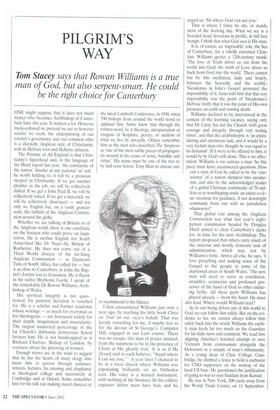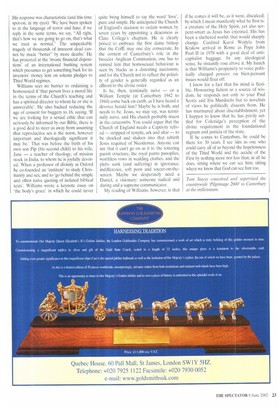PILGRIM'S WAY
Tom Stacey says that Rowan Williams is a true
man of God, but also serpent-smart. He could be the right choice for Canterbury
ONE might suppose that it does not much matter who becomes Archbishop of Canterbury later this year. It matters a lot. However many-cultured we pretend we are or however secular we seem, the underpinning of our country's governance and our common ethic is a distinctly Anglican style of Christianity, with its Hebraic root and Hellenic infusion.
The Primate of All England is that Christianity's figurehead and, in the language of the Hurd report last year, 'the conscience of the nation'. Insofar as any national `us will be worth holding to, it will be a pronoun steeped in Christianity. If we get another plodder in the job, we will be collectively dulled. If we get a John Paul II, we will be collectively raised. If we get a maverick, we will be collectively disarrayed — and not only we English but, on a vastly grander scale. the faithful of the Anglican Communion around the globe.
Whether we are talking of Britain or of the Anglican world, there is one candidate on the horizon who could prove an inspiration. He is neither English nor South Asian-bred like Dr Nazir-Ali, Bishop of Rochester. He does not come out of a Third World diocese of the far-flung Anglican Communion — as Desmond Tutu of South Africa has called for — but is as close to Canterbury as John the Baptist's Jordan was to Jerusalem. He is fluent in his native Brythonic Gaelic. I speak of the remarkable Dr Rowan Williams, Archbishop of Wales.
His spiritual integrity is not questioned; his pastoral devotion is vouched for. He is a scholar and former academic whose writings — as much for everyman as for theologians — are honoured widely for their depth, imagination and muscularity. The largest numerical percentage of the lay Church's dubiously democratic Synod favours him. He is not handicapped as is Richard Chartres. Bishop of London, by wariness about the priesting of women.
Enough straws are in the wind to suggest that he has the hearts of many clergy who know him in person through seminars, retreats, lectures, his tutoring and chaplaincy at theological college and successively at Cambridge and at Oxford. Some remember him for his talk (on making moral choices) at
the latest Lambeth Conference, in 1998, when 700 bishops from around the world stood to applaud him. Some know him through the written word, be it theology, interpretation or exegesis of Scripture, poetry, or analysis of what we live by inwardly. Others remember him as the man who described The Simpsons as 'one of the most subtle pieces of propaganda around in the cause of sense, humility and virtue'. His name must be one of the two to be laid soon before Tony Blair to choose one to recommend to the Queen.
I first encountered Williams just over a year ago, by teaching his little book Christ on Trial on our vicar's behalf. That was keenly rewarding for me, if maybe less so for the devout of St George's, Campden Hill, engaged in our Lent course, There was no escape, this man of prayer insisted, from the summons to be in the presence of Christ at His ghastly trial. 'It is as if He [Jesus] said to each believer, "Stand where I can see you."' A year later I chanced to be in a local church where Williams was expatiating brilliantly on an Orthodox icon. His voice is a trained instrument, with nothing of the Swansea lilt his colliery engineer father must have had, and he urged us, 'Sit where God can see you.'
That is where I fancy he sits, or stands, most of the livelong day. What we see is a bearded head, ferocious in profile, in full face benign. I think that what God sees is His man.
It is, of course, an 'impossible' role, the See of Canterbury, for a wholly exercised Christian. Williams quotes a 12th-century monk: 'The love of Truth drives us out from the world into God; the truth of Love drives us back from God into the world.' There cannot but be this oscillation, daily and hourly, between the heavenly and the earthly. Nicodemus in John's Gospel protested the impossibility of it. Jesus told him that this very impossibility was the point of Nicodemus's Hebraic truth; that it was the point of His own presence on earth and coming death.
Williams declined to be interviewed in the context of the looming vacancy, saying only that Dr Carey has led the Church 'with great courage and integrity through very testing times', and that the archbishopric is 'an intimidating and enormous task, and it would be a very foolish man who thought he was equal to its demands'. If it were to be offered to him, it would be by God's will alone. This is no affectation: Williams is too serious a man. So this piece must leave unanswered questions. How can a man of God be called to be the `con science' of a nation slumped into secular ism, and also be the acknowledged leader of a global Christian community of 70 mil
lion or so worshipping souls: an entire eccle
sia ravenous for guidance. if not downright command, from one with no jurisdiction whatsoever?
That global role among the Anglican Communion was what last year's eightperson commission headed by Douglas Hurd aimed to clear Canterbury's decks for, in time for the next Archbishop. The report proposed that others carry much of the onerous and mostly domestic task of administration, which may not be Williams's forte. Above all else, he says, 'I love preaching and making sense of the Gospel to the people in some of the depressed areas of South Wales.' The new man will need to serve as conciliator, straddler, ecumenist and professed perceiver of the hand of God in other enduring faiths. All these parts Williams has played already — from the heart. He must
also lead. Where would Williams lead?
As to our being driven out of this world to God, we can follow him safely. But on the evidence so far, we cannot always follow him safety back into the world. Williams the earthly man feeds far too much on the Guardian for his daily news and comment. We read him aligning America's botched attempt to save Vietnam from communism alongside the Holocaust as a sample of man's inhumanity. As a young dean of Clare College, Cambridge, he climbed a fence to hold a eucharist for CND supporters on the runway of the local US base. He questioned the justification of going to war to oust Saddam from Kuwait.
He was in New York, 200 yards away from the World Trade Center, on 11 September. His response was characteristic (and this time spot-on, in my eyes): 'We have been spoken to in the language of terror and hate; if we reply in the same terms, we say, "All right, that's how we are going to go on, that's what we treat as normal." The unspeakable tragedy of thousands of innocent dead cannot be made "better" by more deaths,' He has protested at the 'insane financial dispositions' of an international banking system which presumes to get something back for its investors money lent on solemn pledges to Third World regimes.
Williams sees no barrier to ordaining a homosexual if 'that person lives a moral life in the terms of the Church's teaching and has a spiritual director to whom he or she is answerable'. He also backed reducing the age of consent for buggery to 16, saying, 'If we are looking for a sexual ethic that can seriously be informed by our Bible, there is a good deal to steer us away from assuming that reproductive sex is the norm, however important and theologically significant it may be.' That was before the birth of his own son Pip (his second child) to his wife, Jane — a teacher of theology, of mission stock in India, to whom he is joyfully devoted. When a professor of divinity at Oxford he co-founded an 'institute' to study Christianity and sex, and to 'go behind the simple and often naive quoting of isolated biblical texts'. Williams wrote a keynote essay on 'the body's grace' in which he could never quite bring himself to say the word 'love', pure and simple. He anticipated the Church of England's decision to ordain women by seven years by appointing a deaconess as Clare College's chaplain. He is clearly poised to embrace the first dame bishop that the CofE may one day consecrate. In the context of Canterbury's role in the broader Anglican Communion, one has to remind him that homosexual behaviour is seen by blacks as a distorting narcissism, and for the Church not to reflect the polarity of gender is generally regarded as an affront to the divine order.
Is he, then, terminally naive — or a William Temple (at Canterbury 1942 to 1944) come back on earth, as I have heard a devotee herald him? Maybe he is both, and needs to be. Jesus, we may say, was terminally naive, and His church probably truest in the catacombs. You could argue that the Church of England needs a Captivity relived — stripped of temple, ark and altar — to be shocked and shaken into that rebirth Jesus required of Nicodemus. Anyone can see that it can't go on as it is: the tottering parish structure, the royal panto panoplies, worthless vows in wedding clothes, and the plebs sunk (and suffering) in ignorance, indifference, soft porn and soccer-on-thescreen. Maybe we desperately need a Daniel, a visionary; someone radical and daring and a supreme communicator.
My reading of Williams. however, is that if he comes it will be, as it were, discalced; by which I mean manifestly what he first is: a creature of the Holy Spirit, yet also serpent-smart as Jesus has enjoined. His has been a sheltered world: that would sharply change. Cardinal Karol Wojtyla from Krakow arrived in Rome as Pope John Paul II in 1978 with a good deal of anticapitalist baggage. In any ideological sense, he instantly rose above it. My hunch is that Williams's propensity to voice politically charged pensees on bien-pensant issues would float off.
I know for a fact that his mind is flexible. Honouring fiction as a source of wisdom, he responds not only to your Paul Scotts and Iris Murdochs but to novelists of views he politically dissents from. He has murmured about disestablishment, yet I happen to know that he has privily settled for Coleridge's perception of the divine requirement in the foundational regnum and justicia of the state.
If he comes to Canterbury, he could be there for 30 years. I see him as one who could carry all of us beyond the hopelessness of the Third World and the accidie of the First by nothing more nor less than, in all he does, sitting where we can see him; sitting where we know that God can see him too.
Tom Stacey conceived and supervised the countrywide 'Pilgrimage 2000' to Canterbwy at the millennium.























































































 Previous page
Previous page